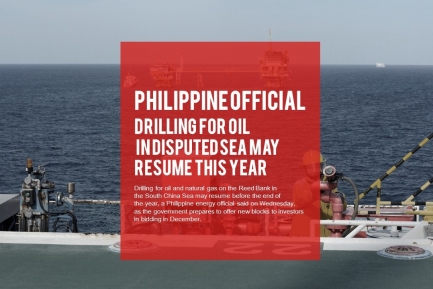|
Drilling for oil and natural gas on the Reed Bank in the South China Sea may resume before the end of the year, a Philippine energy official said on Wednesday, as the government prepares to offer new blocks to investors in bidding in December.
|

|
|---|---|
|
The Philippines suspended exploration at the Reed Bank, which it calls Recto Bank, in late 2014, as it pursued international arbitration over territorial disputes. The bank is in waters claimed by China. Ismael Ocampo, director at the Department of Energy's Resource Development Bureau, told reporters the agency expected the suspension to be lifted in December. He said a directive from the Department of Foreign Affairs directing the Department of Energy to resume oil and gas exploration in the South China Sea was already in the works. China claims almost the entire South China Sea, where about $5 trillion worth of sea-borne goods pass every year. Brunei, Malaysia, the Philippines, Vietnam and Taiwan also have claims. Exactly a year ago, the Permanent Court of Arbitration in The Hague invalidated China's claim to sovereignty over most of the South China Sea. The ruling, which China refused to recognise, clarified Philippine sovereign rights in its 200-mile Exclusive Economic Zone to access offshore oil and gas fields, including the Reed Bank, 85 nautical miles off its coast. "We will try to conduct seismic activities," in the disputed waters, Ocampo said, hopeful that China would not complain and harass crews of survey ships to be deployed. In 2011, Chinese patrol vessels almost rammed a survey ship at the Reed Bank contracted by a PXP Energy Corp unit. President Rodrigo Duterte, who took power shortly before the Hague ruled in favour of Manila, has said he would raise the landmark ruling with China eventually, but he first needed to strengthen relations between the two countries. Duterte, who has been cool towards old ally the United States, hopes closer ties with China will yield billions of dollars in loans and investment in infrastructure, the backbone of his economic agenda. PXP Energy Chairman Manuel Pangilinan said in March he was optimistic his company's exploration project at Reed Bank would soon resume, citing the warming ties with China. The Philippines, which relies overwhelmingly on imports to fuel its fast-growing economy, is under pressure to develop indigenous energy resources. Its main source of natural gas, the Malampaya field near the disputed waters, is due to run out in less a decade. PXP's Reed Bank prospect has indicated natural gas yield potential. More than two dozen oil, gas and coal blocks, including additional areas in disputed waters, may be offered during the December bidding, Ocampo said. By Reuters Reporting by Enrico dela Cruz l Editing by Robert Birsel |
|
Home >> Career Resource >> FAQ
Philippine Official: Drilling For Oil In Disputed Sea May Resume This Year
Related Career Resource
By : Reuters l Reporting by Hallie Gu and Josephine Mason in BEIJING, and Florence Tan in SINGAPORE l Editing by Joseph Radford and Tom Hogue | July 20, 2017
By : By Reuters l Reporting by Neha Dasgupta l Editing by Kenneth Maxwell | August 11, 2017
By : Reuters l Writing by Nidhi Verma l Editing by Christian Schmollinger and Mark Potter | August 23, 2017
By : Reuters l Reporting by Nidhi Verma l Editing by David Evans | July 18, 2017








